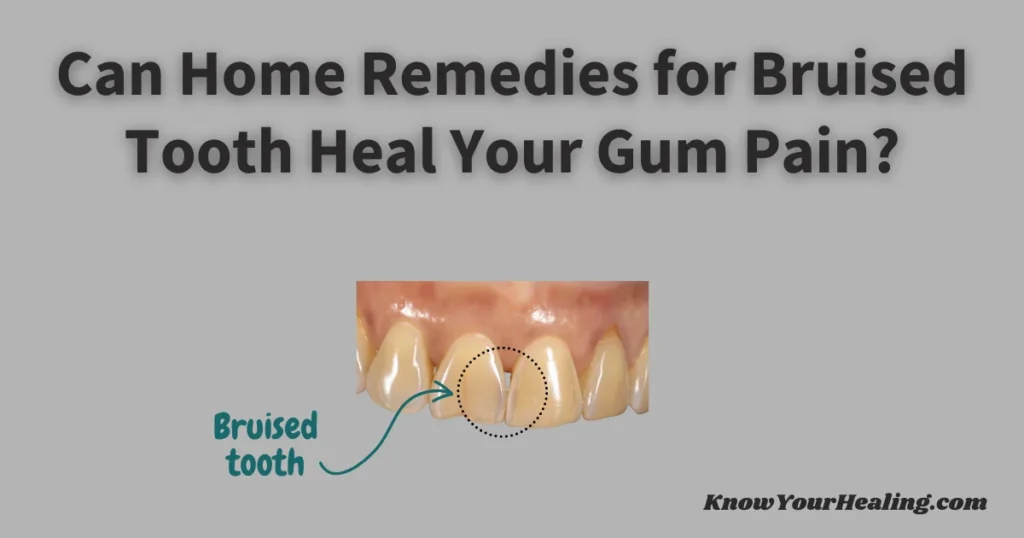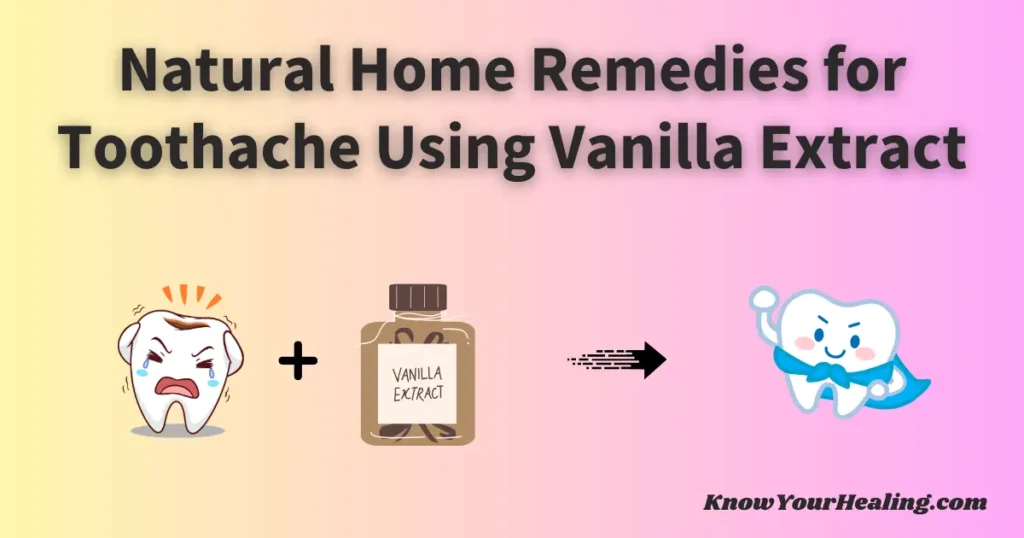Home remedies for a bruised tooth can be an effective way to ease gum pain. Many people experience discomfort in their gums and wonder if there are simple solutions that don’t require a trip to the dentist.
Yes, using techniques like cold compresses and salt water rinses can help soothe gum pain and promote healing.
By incorporating natural treatments, individuals can find relief and support healing.
These remedies are often easy to implement and can be done with everyday household items.
Exploring different options provides various practical solutions for managing discomfort at home.
This post will examine various remedies known to provide relief from both bruised teeth and gum pain.
It will guide you through methods like using essential oils or applying a cold compress to reduce soreness.
Understanding these approaches offers valuable insights into maintaining dental health while managing common oral issues.
Understanding Bruised Teeth and Gum Pain
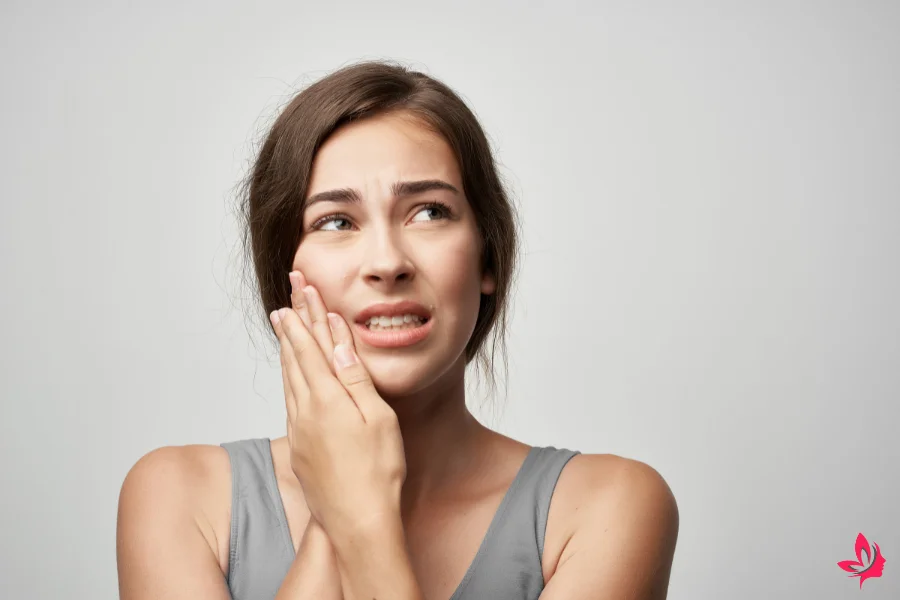
Bruised teeth occur due to impact or excessive pressure, causing pain that can extend to the gums. Recognizing symptoms and causes can help identify the right treatment.
What Causes a Bruised Tooth?
A bruised tooth often results from dental trauma, such as contact sports or biting hard foods.
Injury stretches the tooth ligaments and harms connective tissues, leading to pain and discoloration. Too much pressure from clenching or grinding can also bruise the tooth.
The periodontal ligament acts as a shock absorber, preventing further damage when an impacted tooth is jolted.
Understanding these causes helps in selecting appropriate treatment options and maintaining dental health. If symptoms persist, visiting a healthcare provider is the best action.
Symptoms of Bruised Teeth and Associated Gum Pain
Common symptoms of a bruised tooth include persistent aching and sensitivity to temperature changes.
Sharp pain may occur when biting or chewing, as the affected tooth ligands are inflamed. The gums may also become swollen and tender, causing discomfort.
Pain medication and home remedies, such as cold compresses, can offer relief. A salt water rinse may reduce bacterial infection and soothe gum pain.
If symptoms appear severe, seeking professional dental care ensures proper care and identifies root causes.
How Bruised Teeth Affect Your Gums
Bruised teeth can lead to gum pain due to inflammation and the spread of pressure.
When the periodontal ligament is injured, it affects the general area, including gum tissue.
Treatment options for reducing gum pain include using an ice pack, warm water rinses, and pain-relieving gel.
Good oral hygiene and avoiding complex objects are crucial to the healing process.
In severe cases, professional dental intervention, such as a root canal, may be necessary to prevent further complications and improve oral health.
Effective Home Remedies for Bruised Tooth
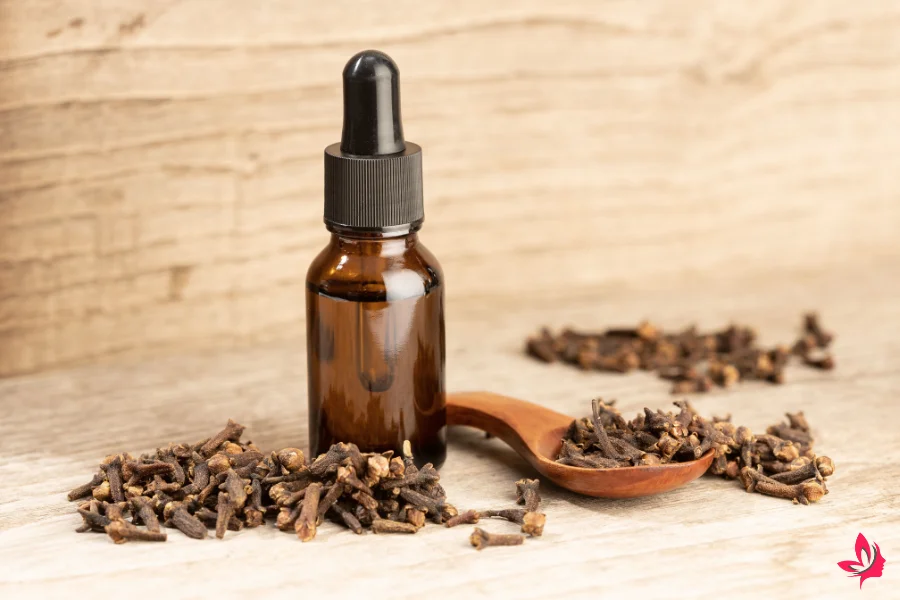
Home remedies can help manage bruised tooth discomfort. Key approaches include using natural ingredients, specific rinsing techniques, and adjusting diet. These can aid in relief and support the healing of the affected tooth.
Natural Ingredients for Pain Relief
Clove oil is known for its pain-relieving properties. A cotton ball can be gently applied to a bruised tooth.
It can provide relief by numbing the area and reducing inflammation.
Vanilla extract, which contains small amounts of alcohol, may also help numb the pain and work as a natural disinfectant.
Cold compresses help reduce swelling and numb the sharp pain of bruised teeth.
Applying an ice pack wrapped in a clean cloth to the jaw at the bruised tooth site may significantly help minimize discomfort.
Rinsing Techniques to Soothe Gum Pain
Rinsing with a salt water solution is a simple yet effective home remedy.
Mixing a teaspoon of salt in warm water creates an antibacterial rinse that can help with dental pain by cleaning the affected area and reducing inflammation.
Hydrogen peroxide rinses are another option. They help eliminate harmful bacteria and food particles stuck around a bruised tooth and soothe gum pain.
Be cautious with hydrogen peroxide to avoid overuse. For best results, both rinses should be used several times a day.
Dietary Changes to Support Oral Health
A soft diet can significantly help reduce strain on a bruised tooth.
Foods like mashed potatoes, applesauce, and yogurt are gentle on sore teeth and promote healing.
Avoiding hard or chewy foods, such as nuts or tough meats, can prevent aggravating the injury.
A soft toothbrush, used in conjunction with good oral hygiene, can further support healing. It keeps the mouth clean without irritating sensitive teeth or gums.
Reducing sugar intake can also prevent tooth decay, improving overall dental health.
How to Treat Gum Pain Associated with Bruised Teeth

Gum pain associated with a bruised tooth can be frustrating, but several ways can alleviate the discomfort and promote healing. From over-the-counter treatments to home remedies, understanding the best course of action can help manage the pain effectively.
Over-the-Counter Treatments vs. Home Remedies
Over-the-counter pain relievers like ibuprofen and acetaminophen can help reduce tooth pain and inflammation.
These medications target the pain directly in the affected area, providing relief for a short period. They work well with a gentle cold compress, which can numb the pain and reduce swelling.
Home remedies are also popular for managing symptoms.
A warm salt water rinse can be a natural disinfectant and soothe the sore tooth area.
Clove oil applied with a cotton ball offers pain relief and, due to its antibacterial properties, helps kill harmful bacteria.
Other natural remedies include applying a teabag containing tannins that may reduce discomfort.
When to Seek Professional Dental Help
While home treatments offer relief, there are times when a dentist should be consulted.
A professional evaluation is crucial if the pain persists or worsens, primarily if sharp pain or swelling occurs.
Sometimes, a root canal or other dental procedures might be necessary to address underlying causes like tooth decay or ligament sprain.
Seeking help ensures the extent of the injury is appropriately assessed.
A healthcare provider can determine if the pain is tied to other complications and recommend appropriate treatment options.
Prompt attention to dental trauma or more severe issues like a sprained tooth can prevent further damage.
Tips for Maintaining Oral Hygiene
Proper oral care is essential for managing gum pain and preventing dental problems.
Regular brushing with a soft toothbrush helps clean the affected tooth gently without applying too much pressure. Flossing removes food particles that can irritate gums.
Good oral hygiene can also prevent gum tissue inflammation or dental disease.
Those with sensitive teeth should avoid hard foods and opt for soft foods. This approach minimizes stress on the area, allowing the healing process to occur without irritation.
Regular dental check-ups ensure that developing issues are caught early, promoting overall dental health.
Long-Term Care for Bruised Teeth and Gums

Long-term care for bruised teeth and gums involves maintaining good oral hygiene and taking preventive steps to avoid further injury.
This includes making lifestyle changes that support oral health and reduce the risk of issues. Proper care aids the healing process and prevents complications.
Preventive Measures to Avoid Future Bruises
Bruised teeth often result from too much pressure or dental trauma. Good oral hygiene is essential to prevent future injuries.
Regular brushing with a soft toothbrush and flossing helps remove food particles that could irritate gum tissue. A salt water rinse can be a natural disinfectant, clearing harmful bacteria from the affected area.
Engaging in contact sports or activities that might cause dental trauma requires protective gear.
A mouthguard can buffer against complex objects. This simple home remedy minimizes the impact on teeth and gums.
It’s also a good idea to avoid chewing on hard foods, as this can damage dental structures like periodontal ligaments and gum tissue.
Lifestyle Changes for Healthier Teeth and Gums
Lifestyle has a significant impact on dental health.
Reducing sugar intake is a good solution, as excessive sugar can lead to tooth decay and weak gums.
Also, quitting smoking improves oral health by enhancing blood flow to gum tissues and reducing bad breath.
Drinking plenty of water daily assists the body in maintaining hydration and oral cleanliness.
Myths and Facts About Home Remedies for Bruised Tooth
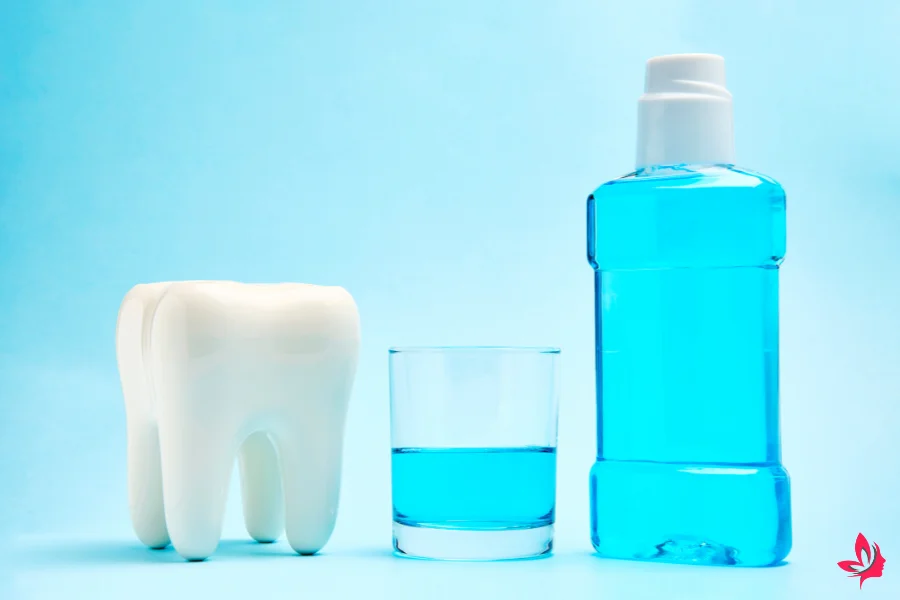
Numerous myths and facts surround home remedies when treating a bruised tooth. Understanding what truly works for easing gum pain and which treatment options might provide false hope is crucial.
Common Misconceptions About Gum Pain Relief
A common myth is that applying aspirin directly to the affected tooth can relieve tooth pain.
In reality, placing aspirin on the gum can cause a chemical burn, potentially worsening the pain.
People also often claim that clove oil is a long-term solution for dental pain.
While clove oil may temporarily ease pain due to its numbing properties, it is not a substitute for professional dental care.
Another misconception involves swishing alcohol in the mouth as a remedy.
While it may numb the area for a short period, it doesn’t address the root of a tooth problem.
Home remedies remain popular, but they can hardly replace good oral hygiene practices or a visit to a healthcare provider.
What Works and What Doesn’t?
Effective home remedies for tooth pain focus on minimizing discomfort and reducing inflammation.
A cold compress applied to the outside of the cheek can reduce swelling and provide relief.
Rinsing with a salt water solution—made by dissolving a teaspoon of salt in warm water—can help clean the affected area and reduce bacteria.
Over-the-counter pain medication, like ibuprofen, can also help ease discomfort but should be paired with the care of a dental professional.
In contrast, using methods such as smashing cloves into a paste or relying solely on essential oils may not address the underlying cause of a bruised tooth.
Consulting with a healthcare professional is the best action for long-lasting relief and a pain-free smile.
Final Thoughts
Home remedies for a bruised tooth can help manage gum pain effectively. While these remedies do not cure the underlying problem, they provide relief.
Applying a cold compress can reduce swelling and numb the discomfort.
Rinsing with salt water may also help cleanse the area and decrease irritation.
Another option is to use essential oils applied with a spray to soothe the pain.
Incorporating these remedies is simple and usually involves ingredients found at home.
It’s important to remember these are temporary solutions, not substitutes for professional dental care.
Key Takeaways:
- Cold compress: Reduces swelling and numbs pain.
- Salt water rinse: Cleanses and soothes gums.
- Essential oils: Offers natural relief.
Frequently Asked Questions
A bruised tooth often results in discomfort, pain, and changes in appearance. Home remedies like salt water rinses and cold compresses can ease pain, but more severe cases may require professional care to prevent complications.
How to soothe a bruised tooth?
A cold compress on the affected area can help reduce swelling and ease pain.
Salt water rinses are also effective in soothing discomfort.
Will a bruised tooth go back to normal?
If the trauma is minor, a bruised tooth may return to normal after some time. However, severe cases might need dental intervention to restore normal function and appearance.
How to soothe a sore tooth nerve?
To soothe a sore tooth nerve, rinse with warm salt water and apply a cold compress. Over-the-counter pain relief may also help.
How do you tell the difference between a dead tooth and a bruised tooth?
A bruised tooth usually shows discoloration and pain, whereas a dead tooth may appear gray and not sensitive to hot or cold stimuli.
How long does a bruised tooth take to heal?
The healing time for a bruised tooth varies, but it often heals within a couple of weeks. A dentist should evaluate persistent pain.
When I bite something hard my tooth hurts?
Pain when biting complex objects might indicate a bruised or cracked tooth. To avoid further damage, consult a dentist.
What to do after you hit your tooth hard?
Apply a cold compress to minimize swelling, and clean the area with a salt water rinse. If pain persists, consult a dentist.
Can a bruised tooth become infected?
Yes, a bruised tooth can become infected if not properly treated. Signs of infection include increased pain, swelling, and discharge.
Can tooth trauma heal on its own?
Minor tooth trauma can heal independently, but dental evaluation ensures no complications arise. Regular monitoring is crucial for healing.
What does a bruised tooth look like?
A bruised tooth can appear discolored, often dark or dull. Swelling and tenderness in the surrounding gums may also be visible.

